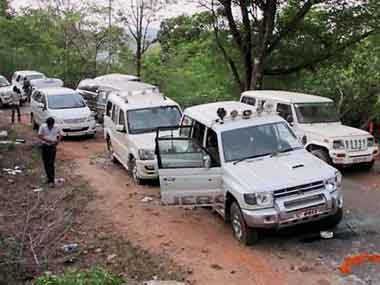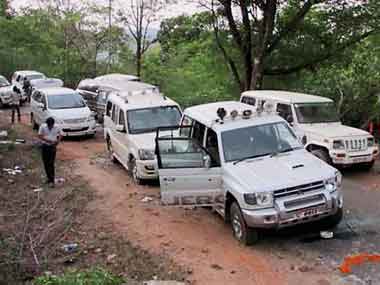By Parivesh Mishra Raipur: Poll preparations are on at a furious pace in Chhattisgarh. Personalities of all political and ideological hues are out in full force, but something is conspicuously amiss in the din. Where are the issues? Bereft of policy options, solutions and ideas, both the major political parties—the BJP and the Congress—have arrived at the battle front with their first list of candidates. However, if an election is meant to be the opportunity for the voter to pick and choose from the bouquet of assurances of better governance by the contesting parties, the battle here promises to be a no-show. In a state where Maoism poses an existential threat, it is only expected that parties would accord the issue the highest priority. Curiously, it is an issue everyone appears keen on evading. While the election commission is caught in a bind over how to conduct the election process in the Maoist heartland - the state election authority recently proposed to the Election Commission to hire helicopters from the Air Force and airlift polling teams “due to huge security and logistical challenge in the region”; the Chief Election Commissioner went a step ahead and announced in Raipur that the commission was considering the option of moving some polling stations to convenient places away from the villages and abandoning some – the political parties remain mute bystanders. The parties had behaved the same way when several polling stations recorded not a single vote in the 2008 elections. The inability of the state to provide an atmosphere in the middle of the geography of the country where people can fearlessly come out and exercise their right to vote is not a point of debate.[caption id=“attachment_1184669” align=“alignleft” width=“380”]  Massacre by Maoists. PTI[/caption] A debate on the issue and the consequent necessity to take a stand is uncomfortable for both the parties, more so for the Congress. The BJP has remained in power for the last ten years during which the state saw the graph of Maoist violence and menace going only one way – up. The Congress saw its top leadership wiped out in a Maoist attack in May this year. The BJP government’s policy of ‘Salwa Judum’—the policy, in effect, of raising and arming a militia of the non-Maoist tribals against the Maoists tribals (and the non-tribal Maoist leadership of course)—for example, was debated extensively in the last five years or so, in public, media and the courts. Yet it does not figure in the debating list. The Congress does not talk about it as it has no unambiguous stand on this issue. The leader of Salwa Judum was a Congress leader—Mahendra Karma—who topped the Maoists’ hit list and was finally killed by them in the May attack. Yet some senior Congress leaders openly favour a softer line against the Maoists and get away with it. Confusion has prompted evasion. Industrialisation of the Bastar region and the consequent displacement of tribals from the forests is yet another issue, but no political party has come out with a policy or plan to assuage the feeling of the locals. It does not come as a surprise that in his public meeting at Jagdalpur, the headquarters of Bastar—the last before the notification came into effect—Chief minister Raman Singh did not use the word ‘Naxal’ or Maoist even once. Darbha, where the Congress convoy was attacked, is less than 30 km away from Jagdalpur. The Congress, strangely enough, did not see any reason to question this shiftlessness. If charges and counter-charges are the ammunition the political parties use during elections, both the parties have arrived at the battle field with empty magazines. The Congress did showcase a few of them but promptly exhausted it on its way to the battle ground. The leaders did not show a unanimous inclination to use this ammo either. Take for example its decision to generate public sympathy out of the Maoist attack on its leaders. The party took out what it called the Kalash Yatras – after detailed planning and preparation. The Yatras were flagged off by senior leaders descending from Delhi but were soon forgotten and virtually abandoned. The numerous charges of corruption against the present government met with the same fate. Sample: Some Congress leaders announced after the killing of the leaders that Dinesh Patel, the son of the state party chief Nand kumar Patel—both were killed—had in his possession some details of a case which, if exposed, would have “threatened the survival of the Raman Singh government”. The leaders, after some time, did what according to them Dinesh was contemplating to do. They made a CD of a narco-test public. A co-operative bank scam had come to light in Raipur about five years ago. Thousands of poor and low income people were swindled of their deposits. During the course of investigation, the police subjected the manager of the bank to a narco-test. The CD of this test showed the manager naming the Chief Minister Raman Singh and four of the senior most members of his cabinet as the recipient of the booty. After making headlines for some weeks, the Congress leadership inexplicably lapsed into deafening silence. In the build-up to the election this case is not heard about. With big issues missing, the debate is increasingly being dominated by local ones. Thus lack of health and education facilities are being discussed more than mushrooming power plants; potholes are being discussed more than increasing road connectivity.
No party wants to talk about Maoism or the issue of displacement due to industrialisation.
Advertisement
End of Article
Written by FP Archives
see more


)
)
)
)
)
)
)
)
)



